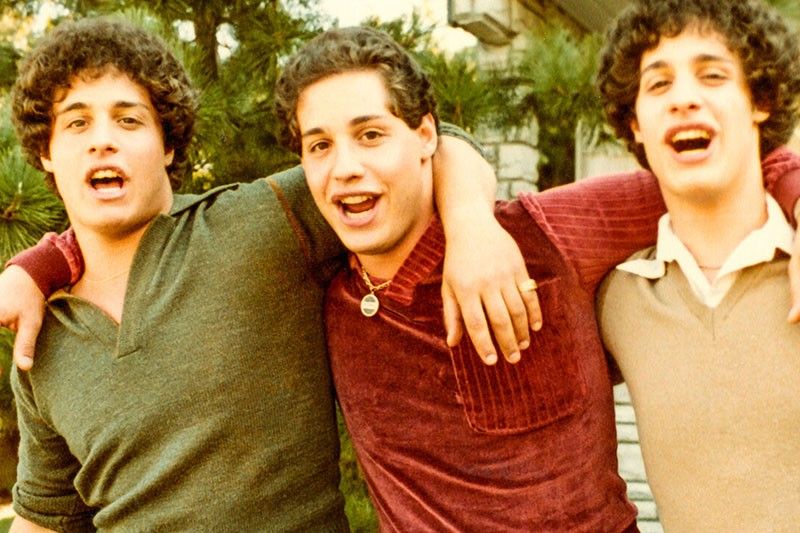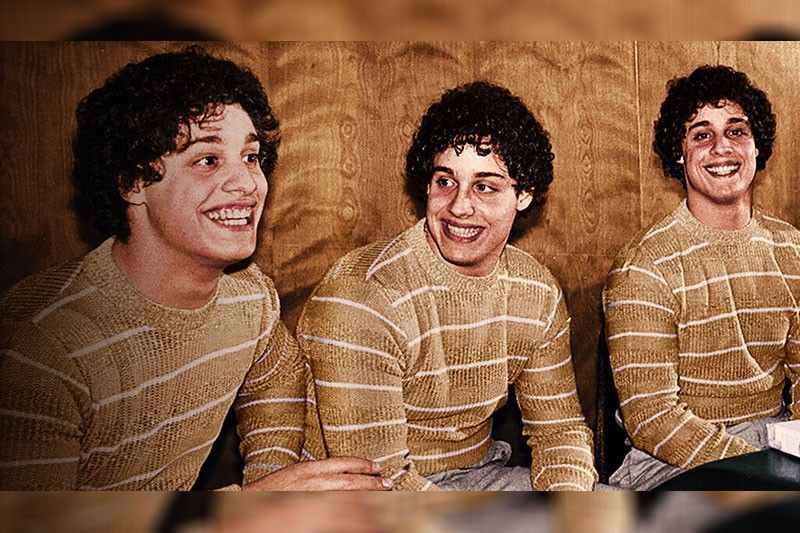Three Identical Strangers: What if you bumped into a lookalike on the street?


Streaming on Netflix is the documentary Three Identical Strangers, the story of triplets placed in three different homes by an adoption agency purportedly because no one else wanted to adopt triplets. One baby was given to an affluent family, another to a middle-class family and the third to a blue-collar family.
The documentary’s director, Tim Wardle, won the Directors Guild of America Award for Outstanding Directorial Achievement in Documentary for this film.
The documentary begins one fine day, when one of the triplets, Bobby, then 19, shows up at a college where everybody seems to know him well and calls him “Eddy,” it was almost bizarre. Perplexed, he looks for this “Eddy” and finds out he has a twin! Voila! The story makes it to the front pages and a third boy, David, shows up. They become a sensation, appearing on the front pages, having a cameo at a Madonna movie, and being interviewed like celebrities by Tom Brokaw and Phil Donahue, no less. They were an endearing oddity. People found cute how the triplets shared mannerisms, smoked the same cigarettes and at one time in their lives, were all wrestlers. Together, they opened a restaurant in Manhattan, and there was a beeline for seats.

But somehow, the euphoria of their reunion slowly dissipated like bubbles. Their fairy tale slowly unraveled into reality.
“What began as a miraculous fairy tale — three long-lost brothers stumble upon one another through sheer happenstance! — has since devolved into a dark tale of deception and inhumanity,” says the Los Angeles Times.
Sadly, the triplets also had similar struggles with mental illness growing up: all three displayed separation anxiety, banging their heads against the bars of their cribs; all three experienced depression at times, and all three made visits to psychiatric hospitals as teenagers.
Why were the triplets separated at infancy? The documentary posits that a prominent child-placement agency for Jewish families may have intentionally separated a number of twins and multiple-birth siblings and placed them in homes of different socio-economic levels for research. The triplets, it turns out, were like “lab rats” (to quote one of the triplets) in a social experiment on nature vs. nurture. If you were raised by a rich family, would you also end up rich? How about if you were raised by a grocer? With the adoptive parents’ consent, the kids were monitored for 15 years ostensibly by a team of researchers wanting to know how adopted children fare in their new families. Coincidentally all three boys had a 21-year-old sister, also adopted.
“We’ve been called ‘subjects.’ We’re victims. There’s a big difference,” one of the brothers says in the documentary. “I don’t want to play off like we’re horribly injured people now as adults — we have families, we have children — we’re relatively normal people. But they treated us like lab rats. Nothing more. And we’re human beings.”
One family member of one of the boy’s adopted families was quoted as saying, “coming from the Holocaust, our family has a knowledge that when you play with humans... (things turn out) very wrong.”
“As the film explains, a psychiatrist and psychoanalyst named Dr. Peter B. Neubauer wanted to solve the mystery of nature vs. nurture and decided to use children put up for adoption as guinea pigs for his research,” according to an online article published by the Institute for Family Studies.
Some experts believe that keeping siblings together when adopted has a positive effect on the children.
Dr. Vicki Belo says that though she was adopted by an aunt, she grew up in the same compound as her biological siblings, stayed with them the whole day, and went home to her adoptive parents at night.
Back to Bobby, Eddy and David. Even if their birth mother wasn’t able to take care of them, experts believe the boys could have been put up for adoption together as a trio, which would have reduced some of their “nature-disrupted challenges.”
In fact, David’s father, who became like a surrogate father to all three boys, says he would have adopted all three. And to think he was the blue-collar worker.
“But the children’s experiences in different families also revealed something most parents know to be true — that parenting styles make a difference,” says the Institute for Family Studies.
Sen. Grace Poe, a standout in the Senate, was a foundling adopted by Fernando Poe Jr. and Susan Roces. But they gave her unconditional love, care and the best education. I remember that when I was her teacher, Grace’s parents FPJ and Susan would come to PTA meetings, or to get her report card (even if her grades were good).
A friend who recently told us she was adopted as an infant also confided she accidentally discovered the name of her birth mother in the baul of her adoptive mother. But she never bothered to trace her roots because, “Wala na akong hahanapin pa sa aruga ng Tatay at Nanay ko.” (I was never wanting in the love and care I got from my adoptive parents.) She grew up successful in both her career and home life.
One person interviewed in the documentary concludes “both (nature and nurture) matter; but I think nurture can overcome anything.”
I know of twins who have an uncanny feeling when the other is sick. I also know of a twin who felt something was not right when, unbeknownst to him, his twin was shot.
There are, indeed, costs to separating a part of a whole. As for what is more important, nature vs. nurture, I believe the latter is the determining factor. Like a brace, it can straighten the imperfections of nature, like a brace does to a broken bone. I know of some adopted children who rebelled when they found out they were adopted, but were lovingly led back to the fold by the loving hand of their adoptive parents.
I once asked a famous designer who has a biological daughter and an adopted son, if there was any difference in how she felt for her children. “Ay wala,” she told me, “parang galing na rin ang bunso ko sa sinapupunan ko. (There is no difference. It’s as if my youngest child also came from my womb.)
How about you? Where do you stand in the debate of nature vs. nurture? *



















